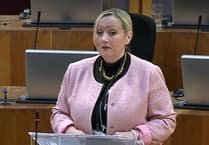Councillors could receive payments when they are voted out by the electorate in future, a committee has heard.
Under the Elections and Elected Bodies bill, councillors in Wales who lose their seats could receive a resettlement payment.
The policy attempts to remove barriers, such as for people with caring responsibilities, and ease the transition for those who are giving up their careers to stand for election.
Similar arrangements are already in place for members of the Senedd and UK Parliament.
After the 2021 election, ten former MSs were awarded transitional payments ranging from £14,000 to £40,000, which cost the public purse more than £360,000, according to a freedom of information request.
The resettlement grant for MSs is guided by the independent remuneration board which produces an annual ‘determination’ on members’ pay and allowances.
‘Redundancy’
Mick Antoniw, the Welsh Government’s chief legal officer, appeared before the Senedd’s local government committee to give evidence on the bill.
He said: “We use the term 'resettlement payments'; to be honest, I suppose more coming from my legal background, I see it as almost a sort of redundancy payment.
“And redundancy payments were established to actually provide that buffer for working people when they lost their employment.
“I think that equally applies to those who take up elected office.”
The counsel general told the meeting on Thursday, 26 October: “It is just about providing a buffer in terms of the fact that after an election there will be a number of candidates who have stood but are now basically unemployed.”
Michael Kay, senior responsible officer for the bill, explained it would be for the renamed Democracy and Boundary Commission Cymru to design the scheme and set payments.
“It's part of the demonstration of respect for elected members,” he said. “So, in the same way that Members of Parliament or the Senedd would receive a resettlement payment, the intention is to respect the nature of the role of a councillor.”
Councillors receive an annual allowance of about £17,000, with certain office holders receiving more, according to a report. Council leaders, for example, are paid between £56,000 and £66,000 a year.
Registration
The committee also heard concerns that plans for automatic enrolment for Welsh elections, but not UK polls, risks confusing voters.
Under the bill, citizens would not have to apply to register to vote in Senedd or council elections. But the proposed reforms will not apply to Westminster nor police commissioner elections.
John Griffiths, who chairs the local government committee, raised concerns about possible confusion among voters, asking: “Might they think because they're automatically enrolled for Welsh elections that that will also apply to UK elections?”
Mr Antoniw acknowledged the issue but he pointed to other examples of differences between elections in Wales and Westminster, such as 16- and 17-year-olds being able to vote for the first time during the Senedd Election in May 2021. According to the Electoral Commission, about 400,000 people in Wales are not on the electoral register.
Privacy
Jayne Bryant, the Labour MS for Newport West, sought assurances that people’s privacy will be respected.
She asked: “What steps are being taken to reassure more vulnerable people that nothing will be placed on the record without their approval?”
Mr Antoniw explained that as people are automatically added to the register, they would be notified within 45 days. He said people will be able to anonymise their details or opt out.
Asked about unintended consequences for people who are illiterate or speak English as a second language, the counsel general stressed that the plans would be piloted.
The Elections and Elected Bodies bill would also create duties around improving diversity as well as disqualify councillors from serving as members of the Senedd.



